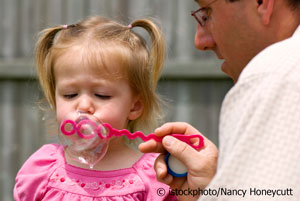Best Practices for Play-Based Learning

You've probably heard a lot about the benefits of play-based learning, but you might wonder how play-based learning actually works. Don't worry. It isn't as complicated as it might sound, and it can be a lot of fun! We believe that as your child's first teacher it's important for you to focus on the following values: relationship building, creativity, and problem solving. A healthy dose of silliness never hurts, either. Read on to learn the best practices for play-based learning.
- Skip the academics. As a parent, you want the very best for your child. In recent years, the toy market has been flooded with toys designed to make your baby smarter. Videos, electronic games, and even flash cards are targeted to very young children. Most of these toys are not necessary, and at times, are inappropriate for the development of a baby or toddler. Instead, focus on simple toys that encourage problem solving and creativity. These toys build symbolic thinking and inventiveness, which lay the foundation for later academic learning. As Albert Einstein once said, “Imagination is more important than knowledge. For knowledge is limited to all we now know and understand, while imagination embraces the entire world, and all there ever will be to know and understand."
- Model how to play. The first time you give your toddler a set of blocks he'll probably bang them together or line them up. Show him how to build a tower. Pretend play is another area that children don't always intuitively understand. Show two puppets or dolls interacting. Ask your child to make you a meal with pretend food and dishes. The renowned child development researcher Lev Vygotsky termed this adult support “scaffolding." You're not taking over play, but you're offering gentle encouragement and instruction, which builds your child's understanding of independent play.
- Boost language development. Play is a natural vehicle for language development. As you play with your little one, talk about what you're doing, like “Here comes the red car. It's going through the tunnel." Restate and expand on your toddler's language. For example, if your toddler says “car," you can expand with “Oh, look, this is a blue car, and it has doors, wheels, and windows."
- Encourage active play. Most babies and toddlers are constantly in motion. Toddlers enjoy spinning, jumping, and rolling. Embrace this natural tendency. Offer safe spaces for rough-and-tumble play indoors and spend plenty of time outdoors. In addition to building gross motor muscles, active play can actually make your baby smarter. David Walsh, clinical psychologist and researcher and author of Smart Parenting, Smarter Kids, says that "exercise builds strong brains" by improving executive function and memory.
- Encourage persistence. Which trait best predicts success later in life? It's not intelligence or academic strength. Persistence and the ability to delay gratification are the two traits kids most need. You may have heard of the “Marshmallow Test" conducted by Dr. Walter Mischel at Stanford University in the late 1960s and early 1970s. He asked preschool-age children to wait several minutes to eat a marshmallow. If they could wait, they got another marshmallow. Those children who were able to wait got better grades, scored higher on tests, and enjoyed more success as adults. Praise your child when she persists at a task or waits her turn, and make sure to be genuine and specific in your praise (e.g. “Putting those beads together was hard, but you kept trying and you did it. Good job!").
- Tread lightly. When you join in play, you are entering your child's world. You are no longer in charge. Sit back and observe your child some of the time, rather than constantly directing play or talking. Try to see play experiences through her eyes. What is she thinking? How does she solve problems? What does she enjoy most? You'll likely come away with a newfound respect for the wisdom of childhood, and in particular, your own child's unique gifts.
- Watch baby's cues. Watch your little one closely for signs of boredom or fatigue. Take a break before she gets too tired. Have a snack, read a book, or offer quiet time. Little ones don't always know when to stop playing and can quickly unravel into meltdown mode when exhausted. Step in before she reaches that point.
For more information:
- Spiegel, Alix (2008). Creative Play Makes for Kids in Control. National Public Radio. Retrieved April 9, 2013, from http://www.npr.org/templates/story/story.php?storyId=76838288.
- Chapman, Sara, MA. Building Problem-Solving Skills in Infants. AbilityPath.org: Support for Parents of Children with Special Needs. Retrieved April 9, 2013, from http://www.abilitypath.org/areas-of-development/learning--schools/problem-solving-skills/articles/building-problem-solving-skills-in-infants.html.
- Elson, Laura (2012). Wonder Years: Keeping Toys Simple Encourages Creativity. Grace: A Magazine for Women. Retrieved April 9, 2013, from http://www.theday.com/article/20121119/GRACE04/121119774/-1/grace04.
- Lev Vygotsky. Tools of the Mind. Retrieved April 9, 2013, from http://www.toolsofthemind.org/extendedcampus/toolsofthemind/about/vygotsky.shtml.
- Leong, Deborah J., Ph.D. and Bodrova, Elena, Ph.D. Building Language and Literacy through Play. Scholastic: Teachers. Retrieved April 9, 2013, from http://www.scholastic.com/teachers/article/building-language-literacy-through-play.
- Shoda, Yuichi; Mischel, Walter; Peake, Philip K. (1990). Predicting Adolescent Cognitive and Self-Regulatory Competencies from Preschool Delay of Gratification: Identifying Diagnostic Conditions. Developmental Psychology 26 (6): 978–986.
- Weill Cornell Medical College (2011). Marshmallow test points to biological basis for delayed gratification. ScienceDaily. Retrieved April 9, 2013, from http://www.webcitation.org/mainframe.php


